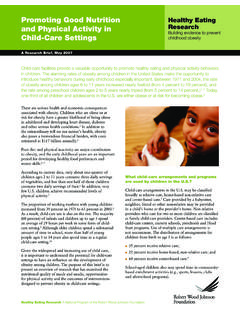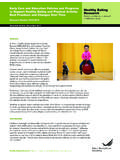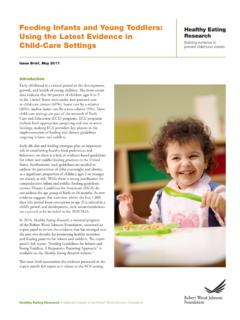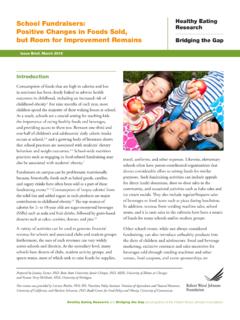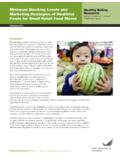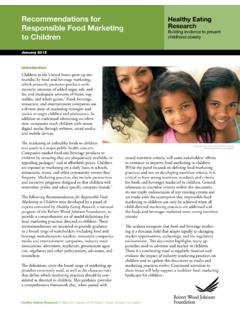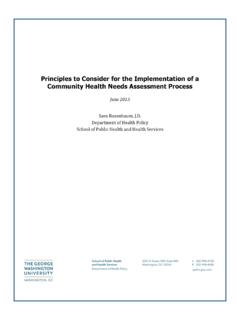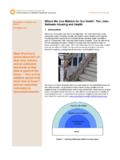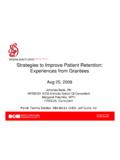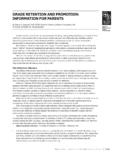Transcription of 2018 Call for Proposals - healthyeatingresearch.org
1 2018 Call for Proposals Concept Paper Deadline: July 18, 2018 (3 ET) 2018 ROBERT WOOD JOHNSON FOUNDATION | CFP: RESEARCH-EVALUATION- LEARNING | MAY 2018 | 1 OF 10 HEALTHY EATING RESEARCH: BUILDING EVIDENCE TO PROMOTE health AND WELL- BEING AMONG CHILDREN THROUGH NUTRITIOUS FOODS AND BEVERAGES ROUND 11 BACKGROUND Optimal nutrition and a healthy weight are critical for child health and well-being across a wide range of dimensions, including physical, socioemotional, and cognitive development. Proper nutrition is particularly important during a child s early years, as key nutrients are critical for neurodevelopment and long-term physical and mental health . Inadequate nutrition, poor diet quality, and obesity are most pronounced in residents of lower-income communities, who often lack access to healthy foods or experience an overabundance of unhealthy foods, as well as in households with limited funds to buy or time to prepare healthful foods.
2 The Robert Wood Johnson Foundation (RWJF) has provided national leadership in efforts to improve the health of all of our nation s children, especially those in lower-income communities and communities of color. This landmark work continues today as part of our vision to build a national Culture of health that enables everyone in our diverse society to lead healthier lives now and for generations to come. Building a Culture of health requires action in four areas: Making health a Shared Value; Fostering Cross-Sector Collaboration to Improve Well-Being; Creating Healthier, More Equitable Communities; and Strengthening Integration of health Services and Systems. Accordingly our efforts to ensure that all children and their families have the opportunity and resources to experience the best physical, social, and emotional development possible through nutritious foods and beverages rely on building the evidence to identify promising and effective strategies that catalyze and support change in those action areas.
3 Healthy Eating Research (HER) is an RWJF national program, which supports research on policy, systems, and environmental (PSE) strategies with strong potential to promote the health and well-being of children at a population level. Specifically, HER aims to help all children achieve optimal nutrition and a healthy weight. HER grantmaking focuses on children and adolescents from birth to 18, and their families, with a priority on lower-income and racial and ethnic minority populations that are at-risk of poor nutrition and obesity. Findings are expected to advance RWJF s efforts to ensure that all children and their families have the opportunity and resources to experience the best physical, social, and emotional health possible, promote health equity, and build a Culture of health . Healthy Eating Research issues calls for Proposals (CFPs) to solicit scientifically rigorous, solution-oriented Proposals from investigators representing diverse disciplines and backgrounds.
4 This CFP is for two types of awards aimed at providing advocates, decision-makers, and policymakers with evidence to promote the health and well-being of children through nutritious foods and beverages. The award types are Round 11, small- and large-scale grants. The two funding opportunities are described in more detail beginning on page 2. 2018 Call for Proposals Concept Paper Deadline: July 18, 2018 (3 ET) 2018 ROBERT WOOD JOHNSON FOUNDATION | CFP: RESEARCH- EVALUATION- LEARNING | MAY 2018 | 2 OF 10 THE PROGRAM Healthy Eating Research is an RWJF national program. Its goals are to: Establish a research base for PSE strategies that promote the health and well-being of children at the population level, primarily through achieving healthy dietary patterns without excess weight gain. Build a vibrant, multidisciplinary field of research and a diverse network of researchers.
5 Ensure that findings are communicated effectively to inform the development of nutrition and obesity-related solutions in the form of PSE changes, with a particular focus on promoting health equity. You can learn more about Healthy Eating Research at Funding Opportunity The two types of funding opportunities included in this CFP are: Round 11 small-scale grants (up to $200,000 and 18 months) Round 11 large-scale grants (up to $500,000 and 24 months) The topic areas, target populations, and types of studies described below apply to all types of grants. Please Note: This funding opportunity includes several significant changes from previous CFPs. Please read the CFP in its entirety. For additional information, sign up to attend the CFP webinar and/or view the FAQ document on the HER website. Priority Topic Areas RWJF funds efforts to change public and institutional policies, systems, and environments in ways that promote improved nutrition, dietary patterns, and healthy weight among children.
6 RWJF is particularly interested in supporting efforts that will impact those at highest risk of poor health and well-being outcomes ( , black, Latino, American Indian/Alaska Natives, Asian Americans, Native Hawaiians, and Pacific Islanders; children living in lower-income rural and urban communities), with the aim of promoting health equity. This work ranges from changes at the state or national level to those taking place at the organizational or community levels. Priority is given to solutions that could be replicated and scaled up if effective and have the potential to reach those in greatest need. Currently, RWJF is focused on PSE strategies that support parents and caregivers ability to provide environments that nurture and foster children s physical, socioemotional, and cognitive health and well-being. In the area of food and nutrition, we are particularly interested in PSE strategies that impact families, early care environments, schools, and communities at a population level.
7 Research studies must focus on PSE approaches with strong potential to improve children s physical, socioemotional, and/or cognitive health and well-being through nutritious foods and beverages. Proposals will need to make clear connections between the study s PSE strategies of interest and specific indicators of child health and well-being. In the past, Healthy Eating Research h as focused on diet-related PSE efforts to reduce child obesity. While reducing child obesity still remains a key goal, we also strive to improve dietary intake and patterns that impact a wider variety of children s short-term and long-term health outcomes. Our goal is to 2018 Call for Proposals Concept Paper Deadline: July 18, 2018 (3 ET) 2018 ROBERT WOOD JOHNSON FOUNDATION | CFP: RESEARCH- EVALUATION- LEARNING | MAY 2018 | 3 OF 10 accelerate evidence-based strategic, actionable, and equitable solutions for improving children s weight and nutrition, diet quality, and food access and security.
8 While important, it is beyond the scope of this CFP to address excessive or deficient intakes of specific micronutrients ( , sodium); rather, we are most interested in approaches that impact dietary patterns more holistically. Topics of interest for this CFP include but are not limited to research exploring: Department of Agriculture s Nutrition Assistance Programs [ , Supplemental Nutrition Assistance Program (SNAP); Special Supplemental Nutrition Program for Women, Infants, and Children (WIC); and Child Nutrition Programs relevant for school and early-care settings ( , Child and Adult Care Food Program, School Breakfast Program, School Lunch Program)]; Other policies and practices in child-care settings, schools, and retail food outlets; PSE changes aimed at (1) increasing access, affordability, and/or demand for healthy foods and beverages ( , reforms to agricultural systems; pricing incentives; potable water access.)
9 Food procurement in early care and pre-K through 12th grade education settings) and (2) decreasing access to and/or demand for less healthy foods and beverages ( , product placement, pricing disincentives, calorie or nutrition labeling); Industry practices and related systems that influence purchasing and/or consumption of healthy or unhealthy foods and beverages ( , marketing of foods and beverages for infants and toddlers and to children and adolescents). All applicants are encouraged to visit the Healthy Eating Research website at to learn more about the program and view the abstracts for studies funded previously, keeping in mind that the focus of those studies was only on PSE strategies aimed at reducing childhood obesity. Targeted Age Groups and Priority Populations Target age groups for studies funded as part of this CFP are infants, children, and adolescents (ages 0 to 18) and their families.
10 All studies must have the potential to impact groups at highest risk for poor health and well-being, and nutrition and weight-related health disparities. We are especially interested in studies focused on black, Latino, American Indian/Alaska Native, Asian American, Native Hawaiian, and Pacific Islander populations; and children living in lower-income rural and urban communities, with the aim of promoting equity. Additional details regarding the importance of Proposals addressing equity can be found under Selection Criteria on page 6. Types of Studies Studies could include any of the following: experimental or quasi-experimental studies; secondary analyses of existing datasets; evaluations of PSE interventions or natural experiments; retrospective analyses of PSE change successes; case studies; financial, economic, or cost-effectiveness studies; health impact assessments; statistical modeling or simulation studies; policy and legal analyses to identify or evaluate promising PSE interventions; and quantitative meta-analyses.
